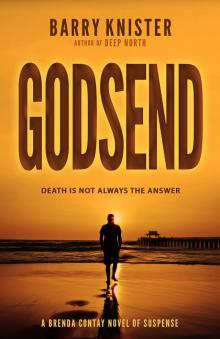- Home
- Barry Knister
The Anything Goes Girl (A Brenda Contay Novel Of Suspense Book 1)
The Anything Goes Girl (A Brenda Contay Novel Of Suspense Book 1) Read online
JOURNALIST BRENDA CONTAY DOESN’T LOOK
FOR TROUBLE—BUT IT KEEPS FINDING HER
When she said “yes” too often in college, she became “the anything goes girl.” Pretty soon her sex life figured in locker-room graffiti.
But when Brenda Contay makes it big on local TV as W-DIG’s Lightning Rod reporter, everything seems to be turning around for her. Except succeeding in tabloid TV because your butt looks good in Levis isn’t much different from the “anything goes” days.
That’s why Brenda quits television to learn the truth behind an old lover’s death. Vince Soublik drowned recently, off a tiny island in the Pacific. But All-State swimmers like Vince don’t just drown.
When she gets to the island, Brenda learns that Vince’s death was collateral damage in a scandal of global proportions. And since it involves one of the ten richest men in America, Brenda’s chance of living to break the story is next to zero.
But you never can tell about “the anything goes girl”—she just hates to lose.
PRAISE FOR OTHER BOOKS
BY BARRY KNISTER
THE DATING SERVICE
“Stomach-clenching action…
one of the freshest thrillers I’ve read in quite a while!”
~ David Morell, bestselling author of First Blood and Rambo ~
“Shockingly real!”
~ Loren D. Estelman, author of the Amos Walker novels,
Master Executioner, and many others ~
“The action and suspense never flag…chillingly realistic!”
~ Rick Boyer, author of Billingsgate Shoal,
Take Back the Land and many others ~
JUST BILL
“…A very charming, sympathetic and compassionate story that can
bring both a smile and tear to the eye.”
~ Connywithay ~
“Knister has a sharp eye for details, and tells his
story sparely yet movingly.”
~ Douglass Fiero ~
“The writer’s succinct, understated prose is altogether
appropriate for his subject, Bill, as well as the two-legged animals,
and comes alive on every page. You will root for Bill and be haunted
by his story long after you finish the novel and feel good that
in Mr. Knister’s fiction—if too rarely in life—people
ultimately do the right thing.”
~ H.F. “Foster” Corbin ~
THE ANYTHING GOES GIRL
Copyright © 2013, 2015 Barry Knister
All rights reserved. Except as permitted under the U.S. Copyright Act of 1976, no part of this publication may be reproduced, distributed, or transmitted in any form or by any means, or stored in a database or retrieval system, without prior written permission of the publisher.
This book is a work of fiction. The characters, incidents, and dialogue are drawn from the author’s imagination and are not to be construed as real. Any resemblance to actual events or persons, living or dead, is entirely coincidental.
Print edition ISBN numbers:
ISBN-13: 978-1494457655
ISBN-10: 1494457652
The Anything Goes Girl is dedicated to
Peace Corps Volunteers past and present.
JULY 13, 1998
Shortly after noon in the western Pacific, rain began falling north of Guam. It continued south to the Eastern Carolines, and reached Pirim at dusk. For the next two hours, the dense shower moved like a brownish curtain over the atoll’s chain of unpopulated islands. By ten it had reached the main island, shrouding Pirim’s five hundred acres in a severe downpour.
When it rained there, words like shower and downpour didn’t apply. The water pounded down with biblical purpose, reducing everything below to a bowed, compliant silence. The paths leading to the lagoon became shallow rivers, and every tree hung low before the onslaught. Rivulets streaming off tin roofs formed beaded curtains at the doorless entryways.
Inside the shanties, the islanders were doing what they did most nights—repairing fishing nets and nursing babies, shouting gossip over the steady drumming. The radio signal was poor due to the rain, but the islanders accepted whatever was broadcast, even white noise. Conversation revolved around tomorrow’s feast, a kama dip.
The Elders were gathered in the meeting house to give the American his title.
◆◆◆◆◆
The meeting house stood at the south end of the village. It was big but simply constructed, open on all sides with a dirt floor, and a steeply pitched thatch roof. The Elders sat inside on mats, facing one another in two rows. Each man’s place was determined by status and age. Above the men hung kerosene lanterns, and shadowed above the swinging lights loomed the undersides of the island’s longest seagoing canoes.
A large tin basin and a gallon jug rested between the two rows. For three hours, the men had been refilling the basin and drinking sachao. Tonight, their drink was made from the fermented seed pods of banana trees mixed with yeast, and some of the American’s sweet-tasting soda-fountain syrup.
One of the Elders leaned forward and grasped a cup made from a coconut shell. With all the reverence of a tea-ceremony in Japan, he dipped it in the basin, filled it, and sat back. He offered it to the American as custom required—cup in his right hand, hand resting on his left forearm.
Vince Soublik bowed and accepted it, but didn’t drink. He rose with the cup and crept behind the men. He was tall and tanned, big in the shoulders from years of competitive swimming. His brown hair was cut short, and he wore only faded blue swim trunks.
Stopping now before Chief Karl, he rested the drink on his forearm, stooped low and looked away. His head was pounding, but the cup was always offered with a bow and turned face.
“Yeyrum. Seyor-in-Leporoi,” the chief said.
Seyor. His new title. Granted permission to drink, Vince maintained the bow—the longer the pause, the greater the courtesy. Hearing murmurs of approval, at last he crept back to his place and sat before raising the cup to his lips.
Overhead, wasps flitted among the suspended canoes. He saw they were safe ones. Last year, Cal Moser had released the first swarms of wasps as part of his agriculture study. To escape that first day, everyone had run into the lagoon.
He finished and lowered the cup, then shook himself to show pleasure.
“Inenen mwao, pwuh?” the chief said.
“Ahng, ihmo, inenen mwao.”
After sixteen months he was fluent in the language, in full command of the island’s system of hierarchy and protocol. It was a great honor for an outsider, a mehn wei, to be given a title.
But his head… Half hearing talk of the district ship’s long-delayed visit, Vince reached forward to stir the basin. The headaches must be caused by some island crud his mehn wei immune system couldn’t handle. Sometimes the pain was so severe he had to visit Moser for a shot.
He filled the cup for the man on his left and sat back carefully. Or did the cup go next to the man on his right? All at once Vince could not remember the order of passing. It was important, a matter of etiquette—
A much sharper pain stabbed through his head. He heard laughter, unintelligible Pirimese words. Someone took the cup as he struggled to his feet. He was supposed to ask permission, but stumbled from the meeting house amid more laughter.
In the darkness outside, tall palms hung limp from the slowing downpour. Rain seethed in shallow pools and fell cool on his naked shoulders. As the pain in his head pulsed, Vince looked around the sodden clearing.
Kerosene lanterns glowed in the surrounding
shanties. A radio played somewhere. Vince focused on his own house and saw a lamp was still burning. Nauko was waiting up for him. Something moved in the entry—Freestyle. The dog saw him and came quickly down the step.
As it splashed across the clearing, Vince started for the path on his right. Nauko. He focused on her, away from the pain. Soon he would be with her, braiding her hair in their cozy little house. He pictured himself standing behind her, feeling the thick texture as she read aloud from one of his books.
Seeing her in his mind made the pressure in his head hurt less. There she was, reading, stumbling over a word as he weighed her lush hair in his hands. It moved him, what he was seeing and feeling. For the first time, Vince understood what it meant. You love her, he thought. It’s true. You’re over Caprice, and love someone else.
He stepped under the dripping trees and followed the path to the beach. As the dog trotted alongside, Vince forced himself to walk slowly. Drinking sachao wasn’t the problem. Not the diet, not the climate. Once the baby was due, he could call for the float plane. He and Nauko would fly to Pohnpei.
The dog saw something and bolted down the coral path, then lunged into the undergrowth. The stray had chosen him some months ago, and now lived under his house.
Like an electric shock, another sharp pain stabbed his forehead. Damn. Pretro got the headaches, too. And Perman’s wife. Reaching the narrow trail to Moser’s, Vince left the main path. The entomologist spent the days in his lab, and typed up field notes at his house in the evenings.
“Hey Moser!” He moved with care, watching the dark ground for fallen coconuts. Looking up, he came to a stop. Moser’s clapboard house was dark. That meant the entomologist was still at his lab, waiting out the rain.
Worried and disappointed, Vince turned away. The dog was still barking as he stumbled back along the narrow trail. Aspirin and ibuprofen had no effect on the headaches. Not Tylenol, not even codeine.
A coconut fell somewhere, the thud like a blow to his temple. He was sweating now, breathing through his mouth. He tripped on a root, caught himself. Mosquitoes had found him, thick everywhere in the still-dry interior. It had never been this bad.
The pain increased, and Vince lost his balance. He fell back, landing hard on sharp bits of bark and coral. He drew up his legs and gripped his head. The small punctures on his spine and shoulders felt like last year’s wasp stings. Groaning, he rolled over and staggered to his feet.
“Jesus, God!”
He stumbled back toward the main trail. Water, cover—anything to stop what was happening. In seconds he reached the broad coral path, lunged left and ran flat out.
“Shit! Help!”
People would hear, come find him. No path met his feet, no sensation, just a swarming hiss fitted to his head like a helmet. He remembered the wasps and flailed the air. Locked between past and present, Vince lunged down the wet trail, crying, stumbling. He saw it happening again, his face and Nauko’s covered with stings, both of them racing to reach the water, screaming women behind them with babies—
◆◆◆◆◆
Hearing shouts, Freestyle stopped barking and turned to listen.
The dog stood twenty yards off the main path, having chased a rat up a swaybacked palm. He barked one last time, then spun and tracked through vines and fallen branches. In seconds he trotted onto the main path, just in time to see the man disappear at the end of the road.
The dog bolted after him. He skirted fallen palm fronds, coconuts, outrigger canoes pulled up for the night. Reaching the end of the coral path, he bounded down onto the beach. The man was slogging out into the lagoon, waving his arms, yelling.
Freestyle crossed to the water’s edge and stopped. Part Labrador retriever, he loved to swim, but something was wrong with the big pool. He stood before the rain-battered lagoon and barked, watching the man.
The rain now stopped, and Freestyle splashed into the lagoon and began paddling. Head high, he struggled to keep the man in sight. The water grew smooth, and moonlight silvered the glassy surface.
Still the dog labored. The water was now the way it should be, and the man would have the stick. This one put out food and never kicked, so Freestyle had come to stay. He plowed on, head high, to the place. He swam in a circle.
Gone. Even his smell. For another minute the animal circled—barking, looking. But it was hard to do, tiring. Looking one last time, he turned and started back. It was wrong. Where was he? He put out food every day and was waiting somewhere, to throw the stick.
Exhausted, the dog reached shore. He shook himself, then turned to face the lagoon, shook himself. For the next several minutes he loped up and down the beach, up and down, looking out.
At last he stepped to the place where the man had run into the lagoon. Freestyle settled there, panting, facing out. Water spread before him, onyx black and glazed with moonlight.
MONDAY, JULY 27
W-DIG STUDIOS, SOUTHFIELD, MICHIGAN
8:40 P.M.
“Okay, people, one more time. On three.”
Everyone groaned. Feeling guilty, Brenda Contay watched as staff members again took their places in the main corridor. She drained her coffee and handed the cup to the producer’s assistant, Joyce, before stepping back into the littered office. She moved to the desk and picked up her phone.
“Do the hair,” Jerry said from the open entry. “Lots of hair. Let me see.”
Brenda put down the receiver and fluffed it out.
Trendy shirt collar loosened and headset on, Jerry scrutinized her like a fashion designer before nodding approval. “Perfect.” He stepped away and the tracked camera and operator once more rolled into position outside her office. Brenda raised the receiver.
“One, people!”
She pretended to listen to the dial tone.
“Two…three!”
She slammed down the handset, grabbed her helmet off the desk and ran into the hallway.
“World War Three, Bren—go!”
She made it look that way, as if something crucial or desperate or tragic was driving her. She huffed as she ran—they were miking her breathing and shoes. People ahead again looked up with fake surprise and fell back. At this point the camera would focus on her bomber jacket, blazoned with her Lightning Rod logo. When she was halfway to the exit doors, Lou Stock glanced up from a clipboard. In his signature blazer, the news anchor offered his Thumbs Up bit of business, holding a pen to prove he wrote the news.
She reached the double doors and slammed through. Blinded by halogen lamps, she pulled on her helmet and ran down the barrier-free ramp. Her cameraman Ned waited next to the Harley. She swung onto the saddle and jump-started the cycle as he hopped in the sidecar. She gunned the engine, waited for Ned to raise his camera, and engaged the clutch. The cycle shot forward. Very bogus, but real enough in its own way. Why say it wasn’t?
Nearing the studio entrance, she saw the security guy outside the guardhouse signal Ten Mile was clear. Brenda gunned the bike onto the road and turned east before opening it up, the Harley revving higher in her hands and spine.
◆◆◆◆◆
Just before the expressway bridge, Ned lowered the camera and nodded for her to ease back on the throttle. It was dark now, rush hour long over. Brenda swung the motorcycle in a wide U turn and started back.
“Got your packing done?” he asked.
“What’s to pack? Brazilians live naked.”
“True. Did Sam buy you a new bikini?”
She glanced at her cameraman. His flapping aloha shirt was covered with parrots, blond ponytail dancing above the bullet-shaped back of the sidecar. She looked back to the road. “Sam moved to California.”
“No way. Since when?”
“Two weeks.”
“You never told me.”
“He moved, that’s all,” she said. “He got a very good offer. We’re still friends.”
“Brenda, come on. What happened? How long were you together?”
Ned was being sympath
etic, and thought she wanted to talk. It embarrassed her. Nothing had “happened,” and she felt no need to confide in someone. She couldn’t even remember how many months she and Sam Towland had been together.
“I wish you were going with me,” she said.
“Nah, I don’t do Spanish. They have someone lined up for you named Julio.”
“Portuguese,” she corrected. “In Brazil they ‘do’ Portuguese.”
“Whatever. Anyway, you’ll love it.”
She knew better. There would be no time to get the feel of the place. All tabloid TV required were good visuals and shoot-from-the-hip first impressions. But agreeing to go to Rio next week was her compromise with Jerry, the new producer. He had refused her request for time off until she mentioned the latest offer from NEWS 2.
“Whoa Brenda,” Jerry had said. “This is W-DIG, remember? We’re family, this is where it all started for you. If you need time off, okay, but how about a little quid pro quo? Here’s how I see it: Brenda Does the Barrio—I love it already.”
Right, she thought. Family. She neared the station’s bright neon sign. Jerry was a con artist, and she missed her old producer. He was in Texas now, a straight shooter.
The guard waved as she reached the gated entrance and swung in. Brenda passed up the broad drive and guided the cycle around the studio’s east wing. At the parking lot’s far end, Maintenance had put up a utility shed for the Harley. They had painted her logo on the side, and a cartoon version of the motorcycle charging forward, like something out of the old Roger Rabbit film.
She entered the shed and braked. Ned unwound his legs, hoisting himself out of the sidecar and stretching as she turned off the engine.
“Sure you don’t want to talk?” he asked. “Go get a margarita?”
“Thanks, Ned. Really, everything’s fine.”
He shrugged and handed her the video camera. “Give that to the boy genius,” he said and winked. “See you man-yanna.”

 The Anything Goes Girl (A Brenda Contay Novel Of Suspense Book 1)
The Anything Goes Girl (A Brenda Contay Novel Of Suspense Book 1) Deep North (A Brenda Contay Novel Of Suspense Book 2)
Deep North (A Brenda Contay Novel Of Suspense Book 2) Godsend
Godsend Just Bill
Just Bill